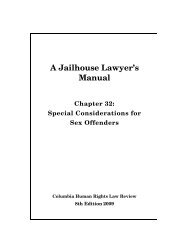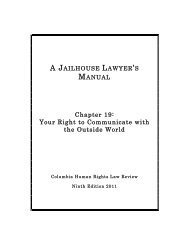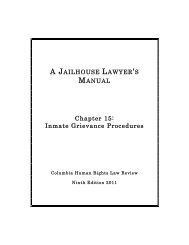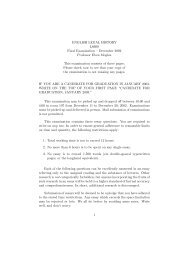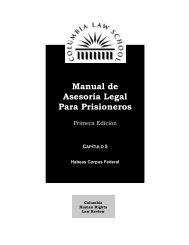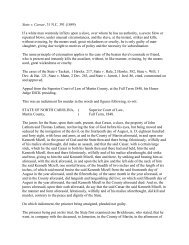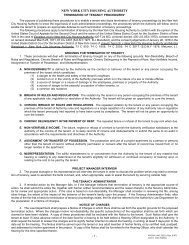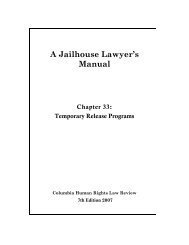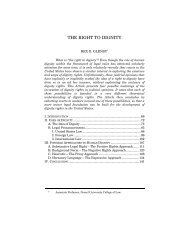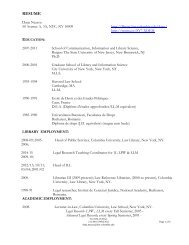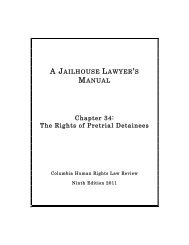A Right to Media? Lorie M. Graham - Columbia Law School
A Right to Media? Lorie M. Graham - Columbia Law School
A Right to Media? Lorie M. Graham - Columbia Law School
Create successful ePaper yourself
Turn your PDF publications into a flip-book with our unique Google optimized e-Paper software.
2010] A RIGHT TO MEDIA? 503<br />
communities in the community and national media.” 309 The program<br />
garnered praise and funding from UNESCO’s International<br />
Programme for the Development of Communications because of its<br />
innovative approach <strong>to</strong> creating informational spaces for indigenous<br />
communities in national and local media, as well as improving the<br />
quality of information being delivered regarding those<br />
communities. 310<br />
More recently, Uruguay under<strong>to</strong>ok a broader initiative in the<br />
adoption of a new community media law, the Community<br />
Broadcasting Bill, which stipulates that a third of the available radio<br />
frequencies must be assigned <strong>to</strong> community media, which is made up<br />
of mostly small radio and television stations. 311 Under this new law,<br />
community media will have sixty days from the date the law takes<br />
effect <strong>to</strong> register with the Regula<strong>to</strong>ry Union of Community Services<br />
and become candidates <strong>to</strong> receive a legal frequency. 312 The law<br />
defines community radio and television stations as “services of public<br />
interest, independent of the state, provided by non-profit civil society<br />
organisations” with the aim of “satisfying the communication needs”<br />
of the country’s citizens and “exercising their right <strong>to</strong> news and<br />
information and freedom of expression.” 313 Innovatively, the law<br />
licenses frequencies in an “open, transparent and public” fashion<br />
instead of at the government’s discretion, as was previously the<br />
practice. 314 This law has the potential <strong>to</strong> benefit many indigenous-run<br />
community media forms and outlets by allowing access <strong>to</strong> official<br />
licensing and increasing the range of the program. 315<br />
309. Intergovernmental Council of the IPDC, 26th Session, Mar. 26–28.<br />
2008, Implementation Reports on Projects Approved and Financed in 2005–2007,<br />
108, U.N. Doc. CI-08/CONF 202/1 (Mar. 16, 2008).<br />
310. Id.<br />
311. Reporters Without Borders, Annual Report 2008-Uruguay 1 (2008),<br />
available at http://www.unhcr.org/refworld/docid/47b418be28.html; New<br />
Community <strong>Media</strong> <strong>Law</strong> Gets Final Approval From Parliament, Reporters<br />
Without Borders, Dec. 14, 2007, http://www.rsf.org/article.php3?id_article=24760.<br />
312. New Community <strong>Media</strong> <strong>Law</strong> Gets Final Approval From Parliament,<br />
supra note 311.<br />
313. Id.; Reporters Without Borders, supra note 311.<br />
314. New Community <strong>Media</strong> <strong>Law</strong> Gets Final Approval From Parliament,<br />
supra note 311; Reporters Without Borders, supra note 311.<br />
315. Reporters Without Borders, supra note 311; New Community <strong>Media</strong><br />
<strong>Law</strong> Gets Final Approval From Parliament, supra note 311. This bill, however,<br />
does not address a major obstacle <strong>to</strong> media rights throughout Latin America:<br />
concern over the safety of those reporting on indigenous issues. See, e.g., Diego<br />
Cevallos, Murder of Reporters Highlight Indigenous Divisions, Inter Press Serv.,



